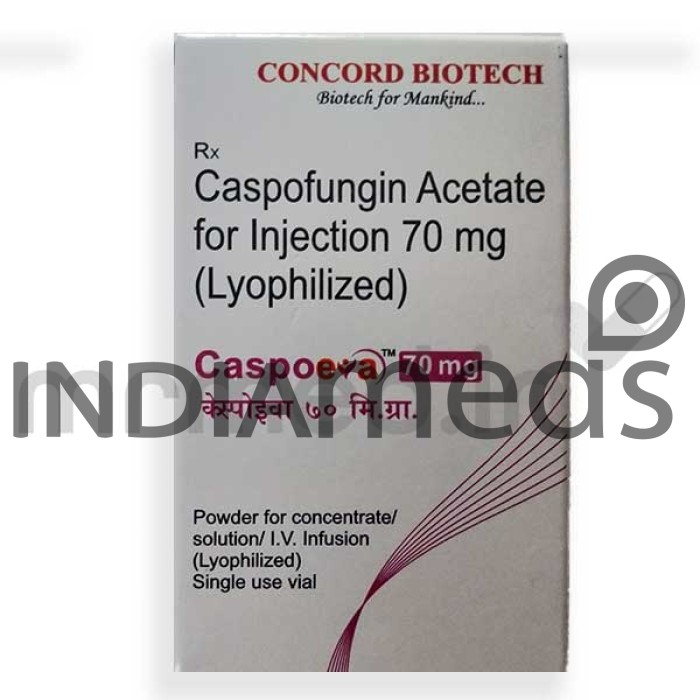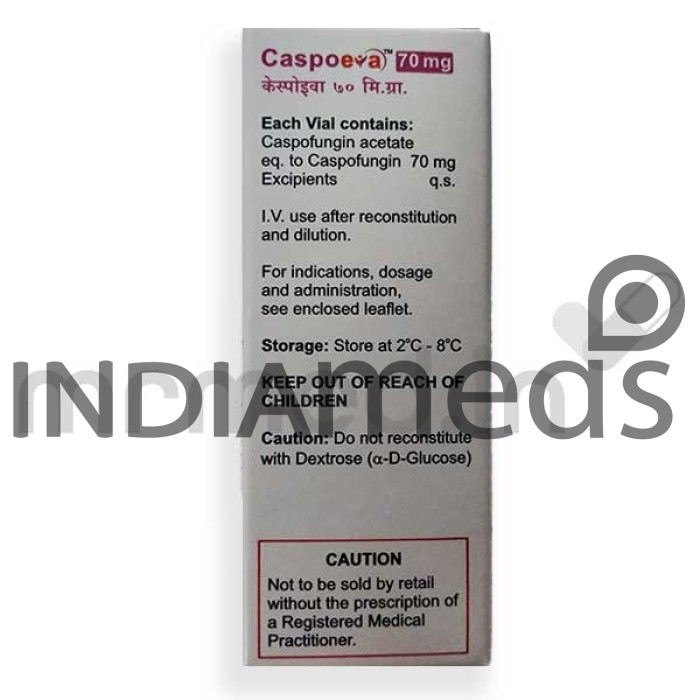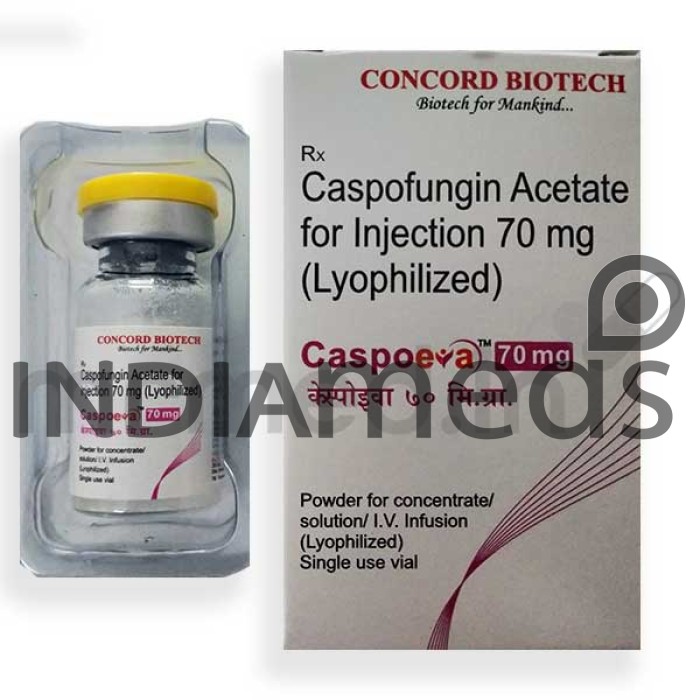Caspoeva 70mg injection is an antifungal with an active ingredient called Caspofungin Acetate. It is used in the treatment of candidemia, esophageal candidiasis, other Candida infections, and aspergillosis, which is a fungal infection in the lungs.
Caspoeva 70mg injection should not be consumed if you are allergic to Caspofungin Acetate or any of its ingredients in the medication. If you have a history of liver problems, your dosage of Caspofungin may need to be adjusted. Inform your healthcare provider if you are currently taking cyclosporin, a medication used to prevent organ transplant rejection or suppress the immune system, as extra blood tests may be necessary during your treatment.
Avoid taking Caspoeva 70mg injection if you have uncontrolled bleeding or severely impaired liver function. Notify your doctor if you have an increased risk of bleeding and recently had injections or infusions of other anticoagulants such as heparin. This medicine is not advised to use in children under 18 years old. Before taking the medicine, inform your doctor if you are pregnant, planning to get pregnant, or think you may be pregnant or are breastfeeding. Notify your doctor if you have or have had a history of any disease.
Therapeutic Effects of Caspoeva 70mg Injection
Pregnancy
Limited information is available on the use of Caspoeva 70mg injection during pregnancy. Notify your healthcare professional if you are pregnant or planning to have a baby think you may be pregnant.
Breast Feeding
Taking Caspoeva 70mg injection while breastfeeding is unsafe because it may affect the child. Inform your doctor if you are breastfeeding.
Lungs
It is unknown whether Caspoeva 70mg injection is safe for patients with lung problems. Notify your physician if you have any lung disease before starting the treatment. Contact your doctor if you experience any lung-related symptoms.
Liver
Caspoeva 70mg injection should be used cautiously in patients with liver conditions. Before starting the treatment, inform your physician about pre-existing liver conditions. Your doctor will adjust the dose if needed.
Alcohol
It is not known whether it is safe to consume alcohol with Caspoeva 70mg injection. Please consult your doctor.
Driving
Based on available information Caspoeva 70mg injection does not appear to impair your ability to drive or operate machinery,
Serious
- Hypersensitivity
- An abnormal rise in liver enzymes
Common
- Inflammation of the vein
- Itching at the injection site
- Headache
- Shortness of breath
- Nausea, vomiting, and diarrhea
- Joint pain
- Chills, fever
- Decreased albumin (type of protein)
- Low potassium levels in blood
- Decreased hemoglobin (oxygen carrying substance)
- Decreased white blood cells
Do not breastfeed while taking Caspoeva 70mg injection. Notify your doctor if you experience any serious side effects. Your medical professional will inform you if you need any dose adjustments. Contact your doctor for more information.
To manage the side effects of Caspoeva 70mg injection, follow the prescribed dosage, and report side effects promptly. Stay hydrated, and avoid alcohol. Maintain a healthy lifestyle, and attend follow-up appointments.
The decision to discontinue Caspoeva 70mg injection before surgery should be made by a healthcare professional, taking into consideration various factors such as the type of surgery, the patient's underlying medical condition, and the risk of bleeding. So, consult your doctor for more information.
Consult your medical professional regarding the use of Caspoeva 70mg injection during pregnancy. The potential benefits and risks should be carefully assessed. Your doctor will suggest taking this medicine only if it's necessary.
Common side effects of Caspoeva 70mg injection include inflammation of the vein, itching at the injection site, headache, shortness of breath, nausea, vomiting, and diarrhea, joint pain, chills, fever, decreased albumin (type of protein), low potassium levels in blood decreased hemoglobin (oxygen-carrying substance) decreased white blood cells. It is crucial to consult your doctor for any concerns or persistent side effects.
| Molecule Name: Caspofungin Acetate | Therapeutic class: Antifungal agent |
Pharmacological class: Echinocandins
| Indications: 1. Fungal infections in febrile neutropenic individuals 2. Esophageal candidiasis 3. Invasive aspergillosis 4. Candidemia |








